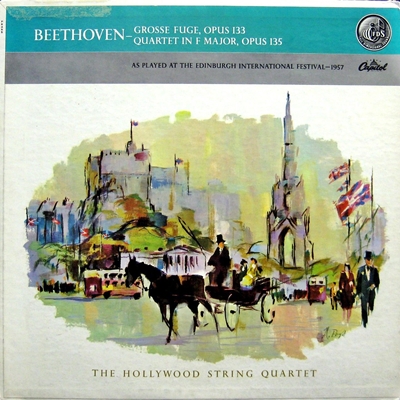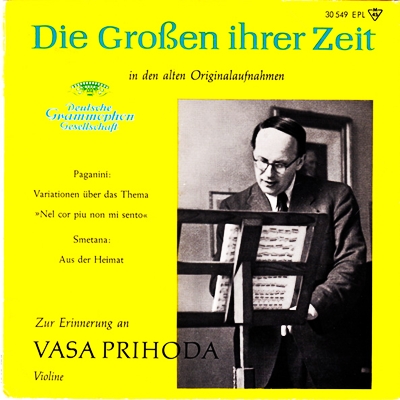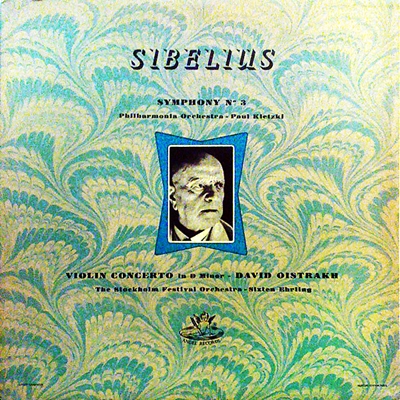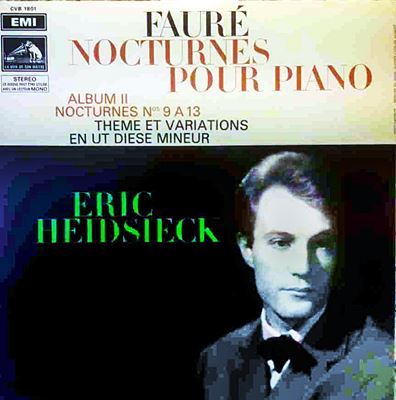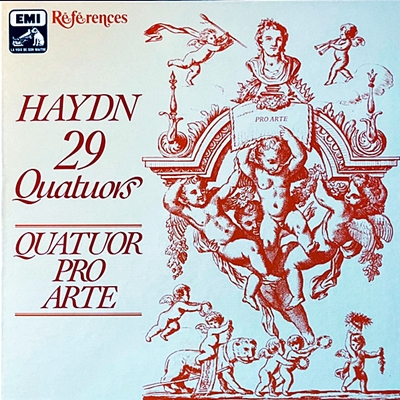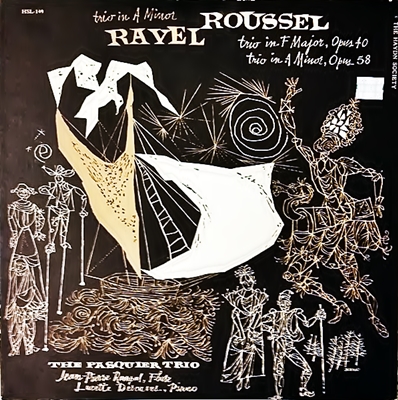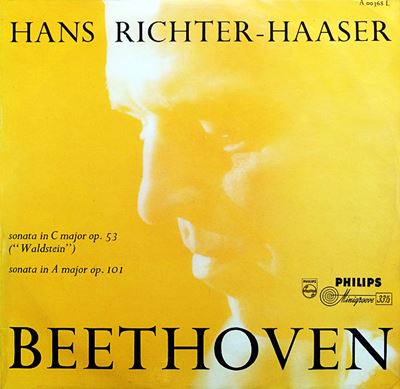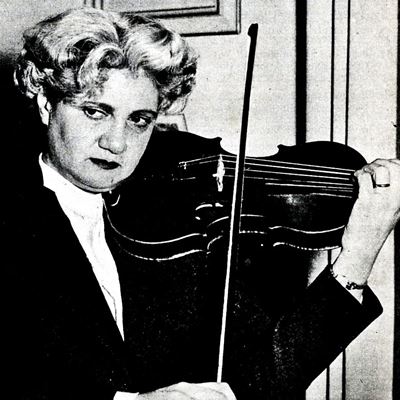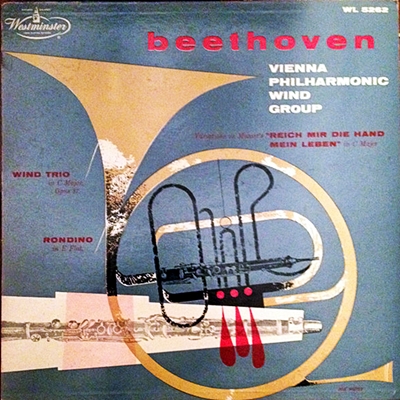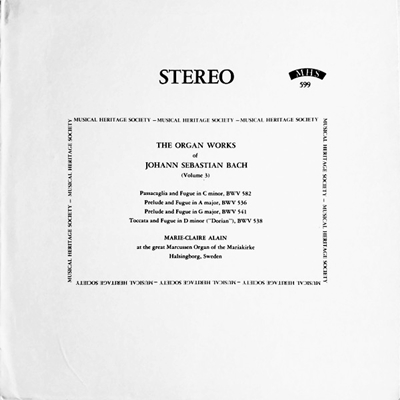クラシック音楽へのおさそい~Blue Sky Label~
シェーンベルク:ワルシャワの生き残り Op.46
ハンス・スワロフスキー指揮 ウィーン交響楽団 (語り)ハンス・ヤーライ、アカデミー室内合唱団 1952年10月28日&30日録音
Schonberg:A Survivor from Warsaw, Op.46
聞き終えて幸福感を味わう音楽とは最も遠く離れた位置にある音楽
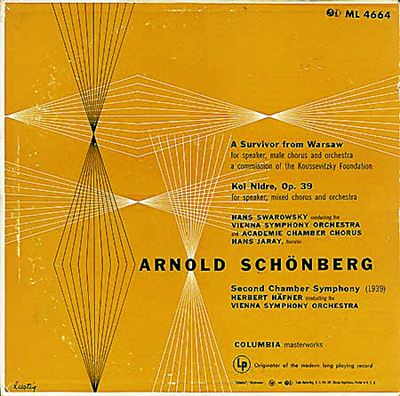
ワルシャワの地下水道に逃げ込み生き残った人の回想として語られていきます。
ユダヤ人たちはドイツ兵の命令で集められ整列をさせられます。そして、理由もなく集められた彼らはドイツ兵に殴り倒されます。そして、その蛮行によっても死ななかったユダヤ人はガス室に送りになります。
そのガス室へと向かう行進の最中に全ての人がヘブライの聖歌「イスラエル世よ聞け」を歌い出すのです。
シェーンベルクはユダヤ人でしたが早い時期にアメリカに亡命したために、ナチスによる直接的な迫害は受けませんでした。しかし、戦後になってナチスが行ったホロコーストの惨劇を知り、さらには彼の姪がナチスによって殺害されていたことも知りこの作品を書き上げました。
作品は基本的にはワルシャワでのユダヤ人の悲劇を語る語り手のために書かれている短い音楽です。しかし、その6分程度の短い音楽のためにシェーンベルクは大規模な管弦楽と男声合唱を用いています。
とりわけ、最後にユニゾンで男声合唱が歌うヘブライの聖歌は聞くものに強烈な印象を与えます。
その聖歌は虐殺されたユダヤ人たちが歌もので、シェーンベルクは「ここは語られるののではない」記しています。
また、この曲は完全な12音技法によって書かれているのですが、その後の前衛音楽のように仲間内だけでしか通じないような理屈だけの音楽になっていないことは、虚心坦懐に耳を澄ませば誰もが納得してもらえると思います。しかし、聞き終えて幸福感を味わう音楽とは最も遠く離れた位置にある音楽でもあります。初演の時には終演後に拍手が起こらず思い沈黙が続いたそうです。
わずか6分あまりの短い音楽ですが、聞き終えた後にズッシリとした重みが残る作品です。
<歌詞>
I cannot remember everything. I must have been unconscious most of the time.
I remember only the grandiose moment when they all started to sing, as if prearranged, the old prayer they had neglected for so many years ? the forgotten creed!
But I have no recollection how I got underground to live in the sewers of Warsaw for so long a time. The day began as usual: Reveille when it still was dark. “Get out! Whether you slept or whether worries kept you awake the whole night. You had been separated from your children, from your wife, from your parents. You don’t know what happened to them… How could you sleep?”
The trumpets again ? “Get out! The sergeant will be furious!” They came out; some very slowly, the old ones, the sick ones; some with nervous agility. They fear the sergeant. They hurry as much as they can. In vain! Much too much noise, much too much commotion! And not fast enough! The Feldwebel shouts: “Achtung! Stilljestanden! Na wird’s mal! Oder soll ich mit dem Jewehrkolben nachhelfen? Na jut; wenn ihrs durchaus haben wollt!” (“Attention! Stand still! How about it, or should I help you along with the butt of my rifle? Oh well, if you really want to have it!”)
The sergeant and his subordinates hit (everyone): young or old, (strong or sick), quiet, guilty or innocent …
It was painful to hear them groaning and moaning.
I heard it though I had been hit very hard, so hard that I could not help falling down. We all on the (ground) who could not stand up were (then) beaten over the head…
I must have been unconscious. The next thing I heard was a soldier saying: “They are all dead!”
Whereupon the sergeant ordered to do away with us.
There I lay aside half conscious. It had become very still ? fear and pain. Then I heard the sergeant shouting: ?Abzahlen!“ (“Count off!”)
They start slowly and irregularly: one, two, three, four ? “Achtung!” The sergeant shouted again, “Rascher! Nochmals von vorn anfange! In einer Minute will ich wissen, wieviele ich zur Gaskammer abliefere! Abzahlen!“ (“Faster! Once more, start from the beginning! In one minute I want to know how many I am going to send off to the gas chamber! Count off!”)
They began again, first slowly: one, two, three, four, became faster and faster, so fast that it finally sounded like a stampede of wild horses, and (all) of a sudden, in the middle of it, they began singing the Shema Yisroel.
Sh’ma Yisraeil, Adonai Eloheinu, Adonai Echad.
V’ahavta eit Adonai Elohecha b’chawl l’vav’cha uv’chawl nafsh’cha, uv’chawl m’odecha. V’hayu had’varim haeileh, asher anochi m’tsav’cha hayom, al l’vavecha. V’shinantam l’vanecha, v’dibarta bam b’shivt’cha b’veitecha, uvlecht’cha vaderech, uv’shawchb’cha uvkumecha. Ukshartam l’ot al yadecha, v’hayu l’totafot bein einecha. Uchtavtam, al m’zuzot beitecha, uvisharecha.
あまり翻訳はしたくない。
論理を感情へと変換する見事な能力
1952年に録音されたこの2曲は世界初録音と言うことらしいです。
「コル・ニドレ」は1938年、「ワルシャワの生き残り」は1947年に作曲された作品ですから、まさに同時代の音楽として、スワロフスキーは強い共感を持って演奏していることがひしひしと伝わってきます。
とりわけ、短いながらも大規模な管弦楽と男声合唱を伴う「ワルシャワの生き残り」の演奏は大きな困難を伴うと思われるのですが、スワロフスキーはその優れた指揮テクニックで見事にその大規模編成を統率しています。
また、12音技法という論理によって構築されている音楽を、精緻な楽曲分析によってホロコーストの非条理さや、ユダヤの呻きのような感情へと見事に変換している事に強い共感を覚えます。
現代音楽はその様な「人間的感情」を意図的に拒絶し、おそらくは仲間内でしか理解し得ないあれこれの仕組みだけを競い合い、それが多くの聞き手に理解されないという事実に対しても「馬鹿には分からない」と開き直っています。
しかし、人の心にふれてこないような音楽というものは聞き手には受け入れられません。もしも、受け入れることが出来るとするならば、それは音楽以外の全く別物として受け入れているのではないでしょうか。
言い過ぎかもしれませんが、現代音楽の大部分はおそらく「音楽」とは異なる全く別のものをつくり出しているのかもしれません。ですから、それは「音楽」とは異なる別のカテゴリーをつくってそちらに隔離し、「音楽」という本来のカテゴリから排除しなければ、現代の音楽としてのクラシック音楽は二度と蘇ることはないでしょう。
音楽に論理が必要なことは否定しませんしそれは当然のことです。
しかし、その論理は最終的には表白すべき人間的感情に昇華されなければいけません。そのためには、作品そのものにそう言う力があることに加えて、その様な変換機能を演奏者が持っていることが必要不可欠です。
始めにも書いたように、スワロフスキーには同時代的共感も含めて、その様な素晴らしい能力を持った指揮者であることを再確認させてくれる録音です。
よせられたコメント
2020-10-10:さとる
- あれ?
こんなに良い曲だったかな・・・?
大昔、上野の図書館でどんな曲かと聴いてみた時、
最初の方でギブアップして次のCDに変えた記憶があります。
・・・あ、アバド盤だったかもw
2022-04-17:エラム
- この曲を過去に作られた曲ではなく「現代の音楽」として聞く羽目になろうとは・・・
【リスニングルームの更新履歴】
【最近の更新(10件)】
[2026-02-18]
ベートーヴェン:弦楽四重奏曲第16番へ長調, Op.135(Beethoven:String Quartet No.16 in F major Op.135)ハリウッド弦楽四重奏団:1957年4月22日,5月11日&6月1日,3日,12日,20日録音(The Hollywood String Quartet:Recorded on April 22, May 11 & June 1, 3, 12, 1957)
[2026-02-16]
スメタナ:わが故郷より(Smetana:from my hometown)(Vn)ヴァーシャ・プシホダ:(P)リディア・ベフトルト 1949年録音(Vasa Prihoda:(P)Lydia Beftot Recorded on 1949)
[2026-02-12]
シベリウス:ヴァイオリン協奏曲 ニ短調, Op.47(Sibelius:Violin Concerto in D minor Op.47)(Vn)ダヴィド・オイストラフ:シクステン・エールリンク指揮 ストックホルム・フェスティヴァル管弦楽団 1954年録音(David Oistrakh:(Con)Sixten Ehrling Royal Stockholm Philharmonic Orchestra Recorded on 1954)
[2026-02-10]
フォーレ:夜想曲第12番 ホ短調 作品107(Faure:Nocturne No.12 in E minor, Op.107)(P)エリック・ハイドシェック:1960年10月21~22日録音(Eric Heidsieck:Recorded 0n October 21-22, 1960)
[2026-02-08]
ハイドン:弦楽四重奏曲第59番 ホ長調 Op. 54, No. 3, Hob.III:59(Haydn:String Quartet No.59 in E major, Op. 54, No.2, Hob.3:59)プロ・アルテ弦楽四重奏団:1936年11月19日録音(Pro Arte String Quartet]Recorded on November 19, 1936)
[2026-02-06]
ラヴェル:ピアノ三重奏曲 イ短調(Ravel:Piano Trio in A minor)(Vn)ジャン・パスキエ:(P)リュセット・デカーヴ (Cello)エティエンヌ・パスキエ 1954年発行(Pierre Pasquier:(Cello)Etienne Pasquier (P)Lucette Descaves Published in 1954)
[2026-02-02]
ベートーベン:ピアノソナタ第28番 イ長調 Op.101(Beethoven:Piano Sonata No.28 in A major, Op.101)(P)ハンス・リヒター=ハーザー 1956年3月録音(Hans Richter-Haaser:Recorded on March, 1956)
[2026-01-31]
ヴィオッティ:ヴァイオリン協奏曲第22番イ短調 G.97(Viotti:Violin Concerto No.22 in A minor)(Vn)ジョコンダ・デ・ヴィート:ヴィットリオ・グイ指揮 グラインドボーン祝祭管弦楽団 1953年9月23日~24日&10月10日録音(Gioconda de Vito:(Con)Vittorio Gui Glyndebourne Festival Orchestra Recorded on September 23-24 & Ovrober 10, 1953)
[2026-01-27]
ベートーヴェン:ドン・ジョヴァンニの「お手をどうぞ」による変奏曲 ハ長調, WoO 28(Beethoven:8 Variations on La ci darem la mano from Mozart's Don Giovanni in C Major, WoO 28)ウィーン・フィルハーモニー木管グループ:1949年録音(Vienna Philharmonic Wind Group:Recorded on 1949)
[2026-01-25]
J.S.バッハ:前奏曲とフーガ ニ長調 BWV.532(J.S.Bach:Prelude and Fugue in D major, BWV 532)(Organ)マリー=クレール・アラン:1961年12月10日~12日録音(Marie-Claire Alain:Recorded December 5-8, 1961)
